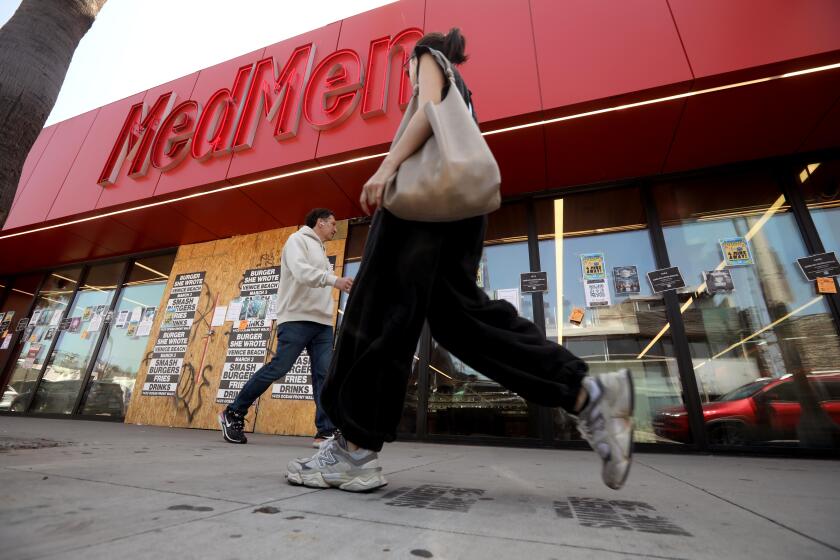Now bankrupt, MedMen owes millions to other companies. Meet the cannabis CEO who called them out

- Share via
For a long time, Olivia Alexander defended MedMen.
Despite the pushback she got for partnering with the cannabis chain that some worried would box out smaller brands, Alexander — who founded Kush Queen, which sells cannabis-infused bath bombs and personal lubricant — valued the retailer’s dedication to stocking shelves with products from small, women-owned lines.
“Even though they’re a big company, they support small brands,” she recalled telling people. “They’re good for our industry.”
Now she thinks the opposite.
In March, the retailer that had been valued at more than $1.5 billion when it went public on the Canadian stock exchange six years ago was deep into a cataclysmic downfall. A few weeks later, the company filed for bankruptcy protection in Canada, disclosing it had more than $400 million in liabilities. In Los Angeles County, meanwhile, a Superior Court judge has appointed an attorney to oversee the liquidation of the company’s California subsidiary.
MedMen owes money to not only big legal, accounting and real estate firms, but also vendors such as Alexander who supplied the retailer with products that filled its shelves.
Fed up with what she said had become an open secret in the industry, Alexander fired off a LinkedIn post at the end of last year accusing MedMen of failing to pay a $1,560 invoice for merchandise she’d delivered to them. More than a 100 people commented, including several other entrepreneurs, who said the retail chain owed them money too — often thousands of dollars.
Once hailed as the Apple store of cannabis, MedMen has shuttered many of its locations. What does that say about shopping for pot in California?
MedMen’s fall has highlighted larger systemic struggles producers such as Alexander face as they try to operate in California’s legal cannabis marketplace. The Times spoke with Alexander about MedMen and the cannabis industry at large. The interview has been edited for brevity and clarity.
Tell me a bit about your company. And how did you start working with MedMen?
I started Kush Queen in 2015. We make a little bit of everything, and we have been working with MedMen almost since the beginning. I really believed, along the way, that we were all part of what I wanted the industry to be, which is diverse and equitable and vibrant.
When did things start to go sour?
I moved to a new distribution company and they were like, “We can’t sell to MedMen. Everyone says they’re going under any minute now.” This was the summer of 2023. But I really thought what everyone else thought, which was that they were too big to fail. So I fought with my distribution partner to deliver these orders and then, of course, they stopped paying.
I went on LinkedIn and wrote the post. And I was inundated — and this is the part that breaks my heart — with messages from tons of brands saying, “Oh yeah, they owe me money.” My LinkedIn DMs are a graveyard of people owed money by MedMen.
MedMen was so afraid of me and the pettiness and my vitriol that they overnighted us a check. They did close out their measly $1,500 invoice with us and I truly believe I was the last person to get paid by them.
How long after your post did they send you a check?
Within two weeks. I posted a follow-up that said, “Look, I’ve been paid, but all these people haven’t.”
What can unpaid invoices mean, especially for smaller companies?
It means they go under or they have to lay people off. If people think it’s bad now, it’s just going to get worse. Everyone is surviving on debt. MedMen was paying a ton of freelance writers to turn out blogs and articles. These are the people that are the most tragic collateral damage of what’s happening.
Can you speak more broadly about the challenges of running a legal cannabis company in California right now?
Like, “How do I do it without crying?” Yeah, it’s tragic. It’s impossible for anyone to make enough money on legal cannabis right now. If I was operating only in the California market, I wouldn’t have enough money to pay my own bills. It’s a loser’s game. The taxes are insane, which is then causing everyone to go to the underground market. The state of California has failed us.
How would you sum up the current state of the industry in one word?
Apocalyptic.
Last month, the Department of Justice formally moved to reclassify marijuana into a category of less regulated substances, a step many in the industry hope could eventually make it easier for cannabis retailers.
Will rescheduling positively affect our industry? Maybe, we don’t know yet. But cannabis and California — there are no two things that go together better. This is our thing and we should be leaps and bounds ahead of every other market. But it’s just been decimated.
More to Read
Inside the business of entertainment
The Wide Shot brings you news, analysis and insights on everything from streaming wars to production — and what it all means for the future.
You may occasionally receive promotional content from the Los Angeles Times.












